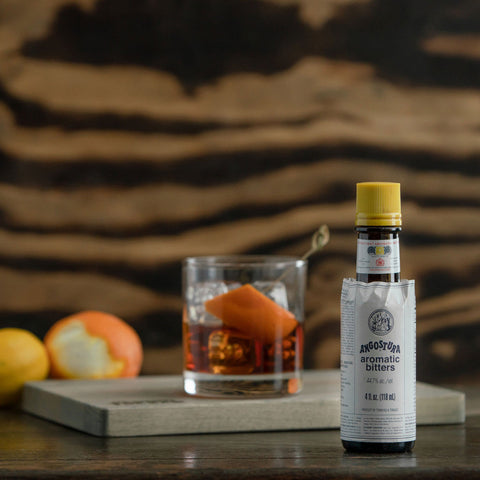Learn about the unique profiles of orange, lemon, grapefruit, and lime bitters, and how to pair them with various spirits, mixers, and garnishes.
This article comes to you from the team of Alambika, leveraging our years of industry expertise to enrich your knowledge.
More than just a cocktail store, we are a collective of Montreal-based experts dedicated to the art of mixology and the culture of hospitality.
Every product mentioned has been personally assessed by us for quality, incorporating advice from leading bartenders and sommeliers, to ensure inclusion in our extensive portfolio.
By choosing Alambika, you're not only supporting our community but also ensuring access to outstanding products that meet our rigorous standards.
Table of content
Citrus bitters are a vibrant and essential component in the cocktail artisan's toolkit, offering a concentrated burst of citrus zestiness that can transform a drink from good to unforgettable. Unlike the straightforward addition of citrus juice, which primarily imparts acidity and a touch of flavor, citrus bitters bring a complex, aromatic intensity without significantly altering the cocktail's balance of sweetness and acidity. These bitters encapsulate the essence of citrus peels, including orange, lemon, grapefruit, and lime, infusing cocktails with a nuanced depth that juice alone cannot achieve. The oils and extracts from citrus peels used in bitters provide a bright, aromatic quality that enhances the overall sensory experience of a cocktail, adding layers of flavor that are both subtle and profound. In essence, citrus bitters allow mixologists to introduce the essence of citrus without the added liquid volume or acidity, enabling a more refined control over the cocktail's flavor profile and texture.

The Citrus Spectrum
The world of citrus bitters is as diverse as it is vibrant, offering a range of flavors from the sweet and complex to the tart and refreshing. Each type of citrus bitters brings its own unique character to cocktails, allowing mixologists to fine-tune the aroma and taste of their creations. Let's explore the distinct profiles and uses of orange, lemon, grapefruit, and lime bitters.
Orange Bitters
Orange bitters, one of the oldest and most popular types of citrus bitters, blend the sweet, fruity essence of orange with a complex array of spices, such as cardamom, caraway, and coriander. This combination results in a versatile bitter that adds depth and complexity to a wide range of cocktails. Orange bitters are a key ingredient in classic cocktails like the Old Fashioned, where they complement the spirits without overpowering them. Famous brands include Angostura Orange Bitters and Regan’s Orange Bitters No. 6, each offering a slightly different take on this essential cocktail ingredient.

Lemon Bitters
Lemon bitters capture the bright, zesty essence of lemon peel, often incorporating additional botanicals to enhance their refreshing profile. These bitters are characterized by their sharp, tangy flavor, which can cut through the richness of spirits and add a clean, crisp finish to cocktails. Lemon bitters work particularly well in light, summery drinks and can offer a zesty contrast to sweeter ingredients. They differ from other citrus bitters by providing a more focused, piercing citrus note, making them ideal for drinks that benefit from a sharp citrusy lift.

Grapefruit Bitters
Grapefruit bitters strike a delightful balance between sweet and bitter, mirroring the dual nature of the fruit itself. These bitters often incorporate both the peel and the flesh of the grapefruit, resulting in a layered flavor profile that can add complexity and a subtle bitterness to cocktails. Grapefruit bitters excel in drinks that call for a balance of sweet and sour elements, offering a nuanced alternative to the more straightforward sweetness of orange bitters or the tartness of lemon bitters. Their versatility makes them a favorite for innovative mixologists looking to add a bittersweet edge to both classic and contemporary cocktails.
Lime Bitters
Lime bitters bring an intense tartness and a bright, refreshing acidity to the bitters spectrum. Crafted from the zest and sometimes the juice of limes, these bitters can inject a vibrant burst of freshness into a cocktail, reminiscent of a freshly squeezed lime. Lime bitters are particularly effective in tropical and summery drinks, where their sharp, clean flavor can elevate the overall taste profile. They offer a unique twist in cocktails that traditionally rely on fresh lime juice, providing the essence of lime without diluting the drink.

See the incredible variation of citrus bitters in Alambika store
Citrus bitters in mocktails with recipes
Citrus bitters have a unique ability to elevate the flavor profile of mocktails, transforming simple non-alcoholic beverages into something special with their intense bursts of zestiness. This section delves into how different types of citrus bitters — orange, lemon, grapefruit, and lime — can enhance a variety of mocktail bases, from sparkling waters to herbal infusions. By adding these bitters, we introduce a new layer of complexity and depth that makes each drink not just a substitute for its alcoholic counterpart, but a delightful choice on its own. Let's explore some mocktail recipes that showcase the versatility and impact of each citrus bitters.
Refreshing Orange Bitters Sparkler
The sweet and spicy undertones of orange bitters blend perfectly with the crisp effervescence of sparkling water in this invigorating mocktail. A hint of vanilla syrup complements the bitters, adding a smooth, comforting note that balances the zestiness of the orange.
-
Ingredients:
- 8 oz chilled sparkling water
- 1/4 tsp vanilla syrup
- 2-3 dashes of orange bitters
- Ice cubes
- Orange twist, for garnish
Preparation : In a tall glass filled with ice, combine sparkling water, vanilla syrup, and orange bitters. Stir gently to mix. Garnish with an orange twist. The result is a mocktail that's both refreshing and complex, perfect for any occasion.
Zesty Lemon Bitters & Herbal Tonic
Lemon bitters, known for their sharp, tangy profile, provide a refreshing punch when paired with a herbal tonic. The addition of fresh cucumber and a sprig of mint introduces a cool, garden-fresh dimension that enhances the drink's vibrancy.

-
Ingredients:
- 8 oz tonic water
- 2-3 dashes of lemon bitters
- Thin cucumber slices
- Fresh mint leaves
- Ice cubes
- Preparation : Fill a glass with ice and add the lemon bitters. Top with tonic water and stir lightly. Garnish with cucumber slices and mint leaves for a mocktail that is as aesthetically pleasing as it is delicious, offering a zesty and herbal refreshment.
Grapefruit Bitters & Rosemary Spritz
Grapefruit bitters, with their perfect balance of sweet and bitter, pair wonderfully with the aromatic depth of rosemary in this sophisticated mocktail. The addition of sparkling grapefruit juice elevates the fruitiness, creating a multi-layered drink.
-
Ingredients:
- 8 oz sparkling grapefruit water
- 2-3 dashes of grapefruit bitters
- A small sprig of rosemary
- Grapefruit slice, for garnish
- Ice cubes
- Preparation : In a glass filled with ice, combine sparkling grapefruit juice and grapefruit bitters. Clap the rosemary sprig between your hands to release its oils and aromas, then stir it into the drink. Garnish with a grapefruit slice. This mocktail delivers a bittersweet symphony, ideal for those who seek a sophisticated, aromatic drink.
Lime Bitters & Coconut Water Refresher
The tartness of lime bitters is brilliantly offset by the natural sweetness and smoothness of coconut water, creating a tropical-inspired mocktail. The addition of fresh lime juice intensifies the citrus flavor, making it an irresistibly refreshing choice.

-
Ingredients:
- 8 oz chilled coconut water
- 2-3 dashes of lime bitters
- 1 tbsp fresh lime juice
- Lime wheel, for garnish
- Ice cubes
- Preparation : In a glass filled with ice, combine coconut water, lime bitters, and fresh lime juice. Stir well to incorporate. Garnish with a lime wheel, offering a mocktail that's both hydrating and zestful, perfect for cooling down on a hot day or after a workout.
These mocktail recipes demonstrate the transformative power of citrus bitters, proving that non-alcoholic drinks can be just as complex and enjoyable as their alcoholic counterparts. By experimenting with different types of citrus bitters, one can craft a wide range of flavors and experiences, making every sip a discovery in the art of mixology.
Pairing Guide: Citrus Bitters Cheat Sheet
Understanding how to pair citrus bitters with a variety of ingredients is key to crafting drinks that are both balanced and bursting with flavor. This cheat sheet offers guidance on matching the distinct profiles of orange, lemon, grapefruit, and lime bitters with spirits, mixers, and garnishes to enhance your cocktail and mocktail creations.

Orange Bitters
- Spirits : Complements the warmth of whiskey, rum, and brandy beautifully, bringing out the depth of aged spirits.
- Mixers : Works well with vermouth, tonic water, and ginger beer, adding a complex, spicy layer to these mixers.
- Garnishes : Pair with a twist of orange peel or a cinnamon stick to accentuate the bitters' spicy, fruity notes.
Lemon Bitters
- Spirits : Perfect for lifting gin, vodka, and tequila, giving these spirits a refreshing, citrusy edge.
- Mixers : Ideal with soda water, lemonade, and herbal teas, enhancing their freshness and adding a zesty punch.
- Garnishes : A sprig of thyme or a slice of fresh cucumber complements lemon bitters, adding a fragrant, summery vibe.
Grapefruit Bitters
- Spirits : Enhances the character of lighter spirits like gin and vodka, and adds an intriguing twist to tequila and light rum.
- Mixers : Pairs beautifully with tonic water, soda, and pink grapefruit juice, balancing sweetness and bitterness.
- Garnishes : Use a slice of grapefruit or a basil leaf to highlight the bitters' bittersweet profile and aromatic complexity.
Lime Bitters
- Spirits : A natural match for tequila and rum, bringing out the tropical notes of these spirits. Also adds a crisp edge to gin.
- Mixers : Complements coconut water, ginger ale, and any citrus-based mixer, emphasizing the tangy, vibrant flavors.
- Garnishes : Garnish with a wedge of lime or a mint leaf to amplify the freshness and tartness of the lime bitters.
Tips for Pairing
- Start with a small amount of bitters and adjust to taste. Bitters are potent and can quickly overwhelm a drink if used too liberally.
- Consider the dominant flavors of your base spirit or mixer. Aim to complement these flavors rather than compete with them.
- Use garnishes not just as decorations but as integral components that enhance the aroma and flavor profile of your drink.
- Experiment with combinations to discover your personal preferences and unique concoctions. The beauty of mixology lies in its creativity and the endless possibilities it offers.
This pairing guide is designed to inspire experimentation and help you navigate the exciting world of citrus bitters. Whether you're crafting a classic cocktail, a modern mocktail, or something entirely your own, understanding how to harmonize these flavors will elevate your mixology game.






